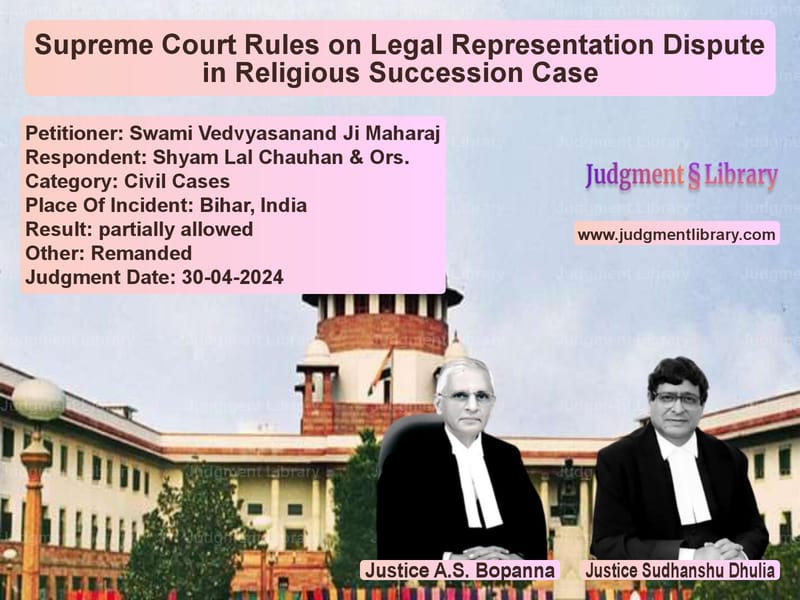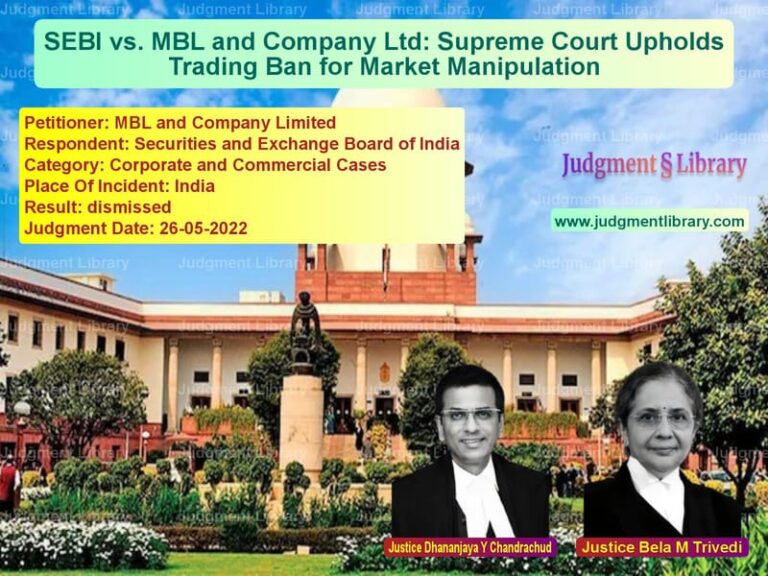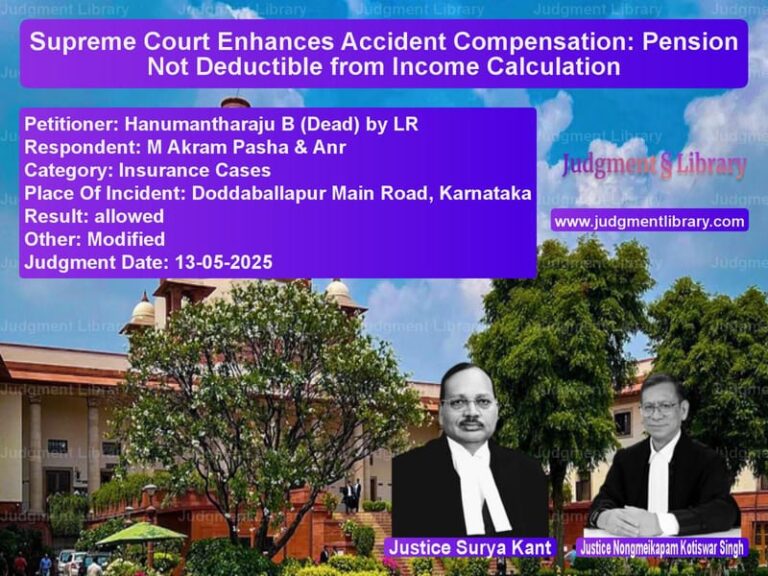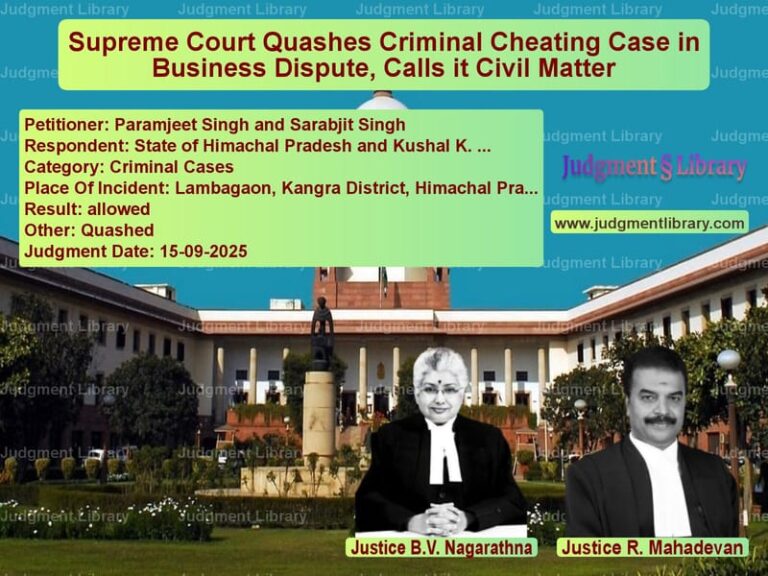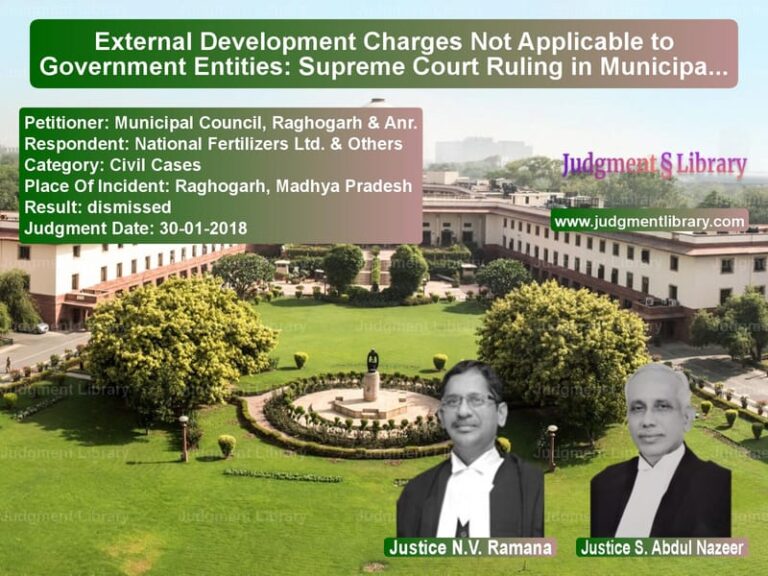Supreme Court Rules on Legal Representation Dispute in Religious Succession Case
The Supreme Court of India has recently delivered a significant judgment in the case of Swami Vedvyasanand Ji Maharaj (D) through LRs vs. Shyam Lal Chauhan & Ors., addressing a dispute concerning the rightful legal representative of a deceased religious leader in a pending civil appeal. This case primarily revolves around the interpretation of Order 22 Rule 5 of the Civil Procedure Code (CPC) and the procedural requirements for substituting a legal heir in an ongoing litigation.
Background of the Case
The legal battle began with a title suit filed by the plaintiffs, Shyam Lal Chauhan and others, concerning the ownership and rights over a property situated in Bihar. The defendant in this suit was Swami Shivdharmanand Ji Maharaj, a religious leader. The trial court dismissed the suit on March 26, 1991, but the First Appellate Court reversed the decision and decreed in favor of the plaintiffs. Consequently, Swami Shivdharmanand filed a second appeal before the Patna High Court, which remained pending.
During the pendency of the appeal, Swami Shivdharmanand passed away on March 20, 1999. Following his demise, two claimants emerged, each asserting themselves as his legal successor to continue the appeal:
- Swami Triyoganand Ji Maharaj (Ram Narayan Bind)
- Swami Satyanand Ji Maharaj (Ramjee Singh) (Respondent No. 6 in the Supreme Court case)
Both claimants sought substitution in the pending appeal, leading to a legal impasse.
High Court’s Proceedings
The Patna High Court, in an effort to determine the rightful legal representative, directed the trial court to conduct an enquiry under Order 22 Rule 5 of CPC. The trial court submitted its report, concluding that Swami Satyanand was the legitimate legal representative. Objections were filed by the opposing claimant, but instead of delivering a ruling solely based on the enquiry report, the High Court, on February 24, 2009, substituted both claimants as legal representatives in the appeal.
This dual substitution was challenged before the Supreme Court. On February 8, 2018, the Supreme Court set aside the High Court’s order and remanded the matter with specific directions that only one person should be substituted as the legal representative.
Legal Battle Intensifies
Following the Supreme Court’s directions, the Patna High Court reviewed the matter and, on January 30, 2019, reaffirmed the trial court’s findings, recognizing Swami Satyanand as the rightful legal representative.
However, complications arose when Swami Triyoganand passed away on December 4, 2018, before his claim could be re-evaluated. The High Court proceeded with its ruling without allowing an adjournment to substitute a legal heir for Swami Triyoganand.
Subsequently, Swami Vedvyasanand Ji Maharaj, claiming succession from Swami Triyoganand, moved two applications before the Patna High Court:
- To substitute himself as the legal representative of Swami Triyoganand.
- To recall the order dated January 30, 2019.
Both applications were dismissed by the High Court on June 19, 2019. The High Court reasoned that since it had already decided the rightful legal representative, there was no need to reconsider the substitution request.
Supreme Court’s Judgment
In its judgment delivered on April 30, 2024, the Supreme Court examined the procedural irregularities in the High Court’s approach.
Key Observations
- The Court reiterated that substitution of legal representatives is procedural and does not confer ownership or title over disputed property.
- The purpose of substitution is to ensure continuity of legal proceedings, not to adjudicate inheritance rights.
- The High Court erred in substituting both claimants initially, leading to unnecessary litigation.
- The High Court failed to properly assess objections to the trial court’s report before confirming Swami Satyanand’s substitution.
- By not addressing the pending substitution application for Swami Triyoganand’s successor, the High Court violated the principles of natural justice.
Supreme Court’s Ruling
- The Court set aside the High Court’s orders dated January 30, 2019, and June 19, 2019.
- The matter was remanded back to the Patna High Court for a fresh determination on substitution.
- The Court clarified that its ruling was based on procedural lapses and did not comment on the merits of Swami Satyanand’s claim.
Key Takeaways
The Supreme Court’s decision sets a critical precedent in cases involving succession disputes within religious institutions and other civil matters:
- Procedural fairness is paramount. Courts must ensure all parties have an opportunity to present their claims before substitution decisions are made.
- Substitution does not establish ownership. The appointment of a legal representative is only for litigation purposes.
- Natural justice must be upheld. The failure to allow a substitution request for a deceased claimant’s successor was a significant error.
Conclusion
The judgment in Swami Vedvyasanand Ji Maharaj vs. Shyam Lal Chauhan & Ors. underscores the importance of procedural integrity in judicial proceedings. While the dispute over the rightful successor to Swami Shivdharmanand remains unresolved, the Supreme Court has ensured that due process is followed, allowing for a fair determination of legal representation.
The case now returns to the Patna High Court for reconsideration, where the parties will have another opportunity to establish their claims.
Petitioner Name: Swami Vedvyasanand Ji Maharaj.Respondent Name: Shyam Lal Chauhan & Ors..Judgment By: Justice A.S. Bopanna, Justice Sudhanshu Dhulia.Place Of Incident: Bihar, India.Judgment Date: 30-04-2024.
Don’t miss out on the full details! Download the complete judgment in PDF format below and gain valuable insights instantly!
Download Judgment: swami-vedvyasanand-j-vs-shyam-lal-chauhan-&-supreme-court-of-india-judgment-dated-30-04-2024.pdf
Directly Download Judgment: Directly download this Judgment
See all petitions in Contract Disputes
See all petitions in Succession and Wills
See all petitions in Property Disputes
See all petitions in Judgment by A. S. Bopanna
See all petitions in Judgment by Sudhanshu Dhulia
See all petitions in partially allowed
See all petitions in Remanded
See all petitions in supreme court of India judgments April 2024
See all petitions in 2024 judgments
See all posts in Civil Cases Category
See all allowed petitions in Civil Cases Category
See all Dismissed petitions in Civil Cases Category
See all partially allowed petitions in Civil Cases Category

